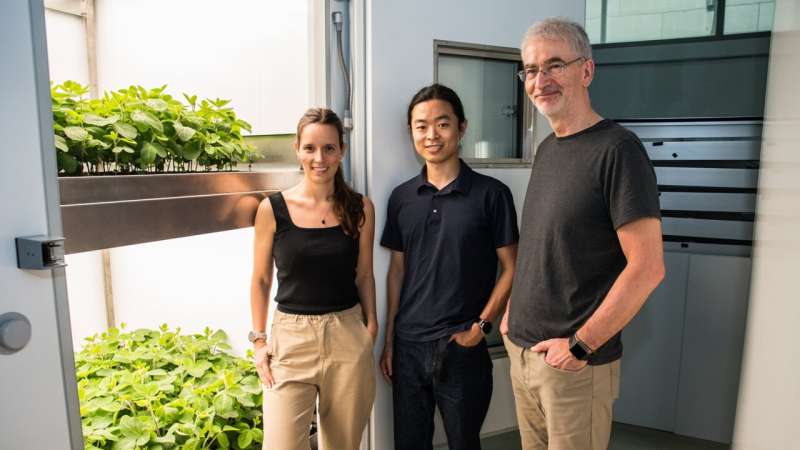December 30, 2025 | 20:29 GMT +7
December 30, 2025 | 20:29 GMT +7
Hotline: 0913.378.918
December 30, 2025 | 20:29 GMT +7
Hotline: 0913.378.918

Vertical farming team, Dr. Vanesa Calvo-Baltanas, Ph.D. candidate Jooseop Park and Prof. Senthold Asseng with one of the vertical farm units dedicated to the cultivation of soybean at TUMCREATE, Singapore. Credit: Israel Tan Si Lie/TUM.
Vertical farming can do more than lettuce. A research team headed by TUMCREATE, a research platform in Singapore, led by the Technical University of Munich (TUM), has investigated the cultivation of six food groups in vertical farming: crops, algae, mushrooms, insects, fish and cultivated meat. In this study published in PNAS Nexus, the researchers show the positive effects of vertical farming on both yield and environmental impact and underline its role in future food security.
Under certain circumstances, traditional agriculture reaches its limits, for instance, after extreme weather events or in areas with a high population density and thus demand. "Vertical farming is a valuable addition here: Food can be grown close to consumers, independent of the weather and using space efficiently," explains Dr. Vanesa Calvo-Baltanás, the lead researcher of the publication, working at the TUMCREATE research platform in Singapore.
In this study, she and other researchers investigated the potential of vertical farming for food security. The team presents theoretical estimations backed by previously published experimental data. Based on these data, the researchers established a quantitative framework to evaluate the yield and potential environmental impact of controlled environment agriculture, such as vertical farming.
The study offers insights into the potential of various food groups in a 10-layer vertical farming system: crops, algae, mushrooms, insects, fish and cultivated meat. Compared to field crops, these foods can increase the protein yield per area nearly three hundredfold for crops and over 6,000-fold for mushrooms and insects.
The study findings show that this total and protein yield increase through controlled environment agriculture systems offers benefits in environmental impact. Across all food groups, controlled environment agriculture reduces the use of land, and eliminates the need for disease measures such as pesticides and antibiotics.
The research was carried out as part of the Proteins4Singapore project. The project aims to research sustainable and functional proteins to supply urban areas such as Singapore. With its "30-by-30" strategy, the state aims to produce 30% of its nutritional requirements locally by 2030. The study results confirm that vertical farming can present a resource-efficient part of this strategy.
"The potential of vertical farming is far from exhausted," emphasizes Senthold Asseng, Professor of Digital Agriculture at TUM and a Lead Principal Investigator at TUMCREATE.
According to the researchers, farming these novel food groups vertically may have further optimization potential besides their yield. For example, mushrooms and insects could help close resource cycles with indoor crops. They process the waste products of crop processes and make them available again as edible and nutritious food.
Mushrooms and insects are also examples of foods that require little light. Cultivating these foods is particularly interesting as they reduce energy consumption and, thus, associated costs. This overcomes the main disadvantage of vertical farming and provides valuable nutrients.
The biggest challenges for controlled environment agriculture food systems are the high energy demand required for cultivation and the social acceptance. Certain foods that offer advantages in vertical farming, such as algae and insects, are currently not generally accepted by many consumers.
"Controlled environment agriculture can revolutionize food production. However, technological advances, interdisciplinary research to tackle energy issues, policy incentives and public engagement are needed to realize its full potential," says Dr. Calvo-Baltanás.
She emphasizes that the study provides a framework for policymakers, industry, and researchers to make informed decisions for sustainable food production.
(Phys.org)

(VAN) From extensive shrimp ponds, baskets of don gathered on the mudflats, to boats carrying visitors to watch birds, all livelihoods here depend on clean water, green forests, and the calls of migratory birds.
/2025/12/26/0703-3-204813_117.jpg)
(VAN) Transparency in information and listening to local people have helped address ground clearance bottlenecks and build social consensus, thereby accelerating the progress of the JICA3 irrigation project.
/2025/12/27/0609-3-233846_327.jpg)
(VAN) The JICA3 project is expected to become a 'water shield,' helping control saltwater intrusion, proactively secure water resources, protect livelihoods, and promote sustainable development in coastal areas.
/2025/12/26/5654-3-164509_655.jpg)
(VAN) As Viet Nam makes strong commitments toward achieving net-zero emissions, controlling and reducing methane emissions in livestock production is increasingly becoming a mandatory requirement.

(VAN) 'People, Primates, Plants: Co-managing Biodiversity and Improving Livelihoods in Vietnam' (the PPP Project) is an international initiative implemented in Vietnam by BGCI, CEGORN, and ICRAF/World Agroforestry.

(VAN) Dak Nong established a risk-level zoning map for coffee, built a digital data platform for the sector, and promoted certified production in line with EUDR.
/2025/12/25/2709-1-211551_295.jpg)
(VAN) In response to the U.S. Marine Mammal Protection Act (MMPA), Gia Lai province is implementing many solutions to protect marine mammals and develop sustainable, responsible fisheries.